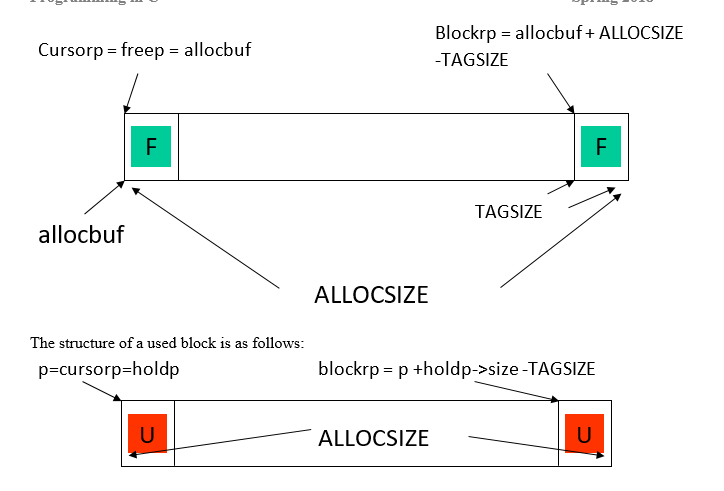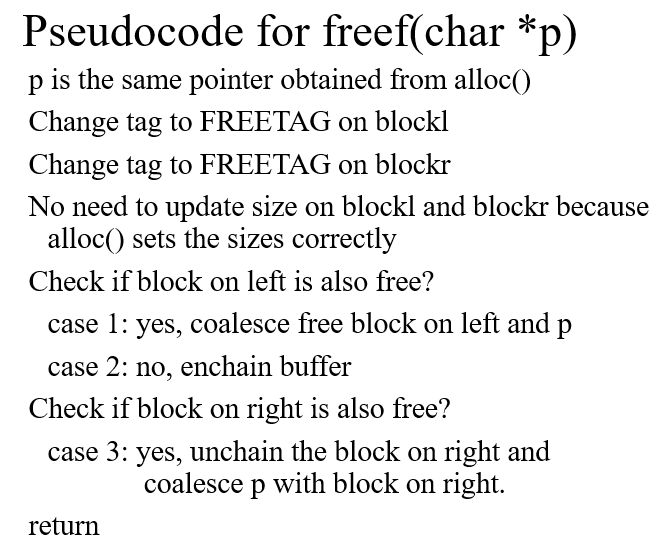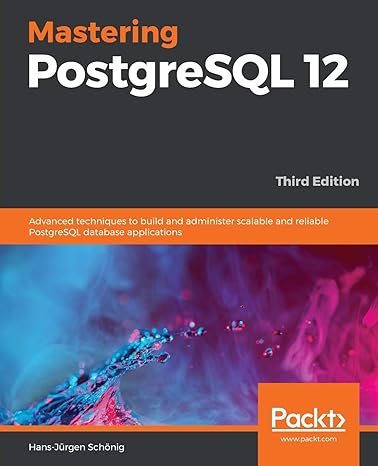Question
C dynamic storage allocation program In this assignment, you are to write part of a dynamic storage allocation package. The package provides three function calls:
C dynamic storage allocation program
In this assignment, you are to write part of a dynamic storage allocation package. The package provides three function calls: void initalloc(), to initialize the data structures involved; char * alloc(int n), which returns a pointer to a block of n chars when called; and void freef(char * p), which frees the block of n chars earlier given to the data structure so that it can be given out to another. A package somewhat like this is covered in Section 8.7 of Kernighan and Ritchie -- however, be very clear that there are important differences between the two packages. The most important differences are that we do NOT try to allocate new space if we run out, we keep ALL our space to allocate in a single array, and we do not keep our free blocks in order, so we find another way to coalesce blocks when they are being freed (one which is faster than a linear search of the free list).
The algorithm you will be working on takes storage blocks from an array of ALLOCSIZE characters, and returns them to requesting callers. The main feature of this package is that these blocks can then be freed in any order and the small blocks freed will be merged back into longer blocks in the array structure. In order to perform this merge efficiently, a rather complex structure must be placed on the individual blocks passed out to callers. In particular, this means that if a caller wants to alloc(n), we must look for a block of n+k bytes, where the k bytes will contain the overhead.
In this program, the structure of a free block is as follows:
 In separate files in this directory are alloctest.c, alloc.c, and alloc.h. The file alloctest.c is a main() program to drive and test your alloc() and freef() functions. All of the alloc(), initalloc(), and some needed helper functions enchain() and unchain() to place blocks on the free chain of blocks are already provided. NOTE: The functions in alloc.c that can be called from the main program which in a separate source file are not declared with the keyword static. Other functions that are only accessed by functions in the same file are declared with the keyword static. This means that they are not part of the API to alloc.c and cannot be called directly from the main program.
In separate files in this directory are alloctest.c, alloc.c, and alloc.h. The file alloctest.c is a main() program to drive and test your alloc() and freef() functions. All of the alloc(), initalloc(), and some needed helper functions enchain() and unchain() to place blocks on the free chain of blocks are already provided. NOTE: The functions in alloc.c that can be called from the main program which in a separate source file are not declared with the keyword static. Other functions that are only accessed by functions in the same file are declared with the keyword static. This means that they are not part of the API to alloc.c and cannot be called directly from the main program.
Your job is to write the freef() function. Note that each block which is handed out has information at the left (struct blockl) and at the right (struct blockr), to aid the freef() function in coalescing freed blocks. In particular, both ends have an 8-bit pattern to let us know if the block is free or used. Then if it is free, the length is immediately available, in particular so one can get back to the left end of the block from the right end. At the left end of the block is the pointer to the next and previous blocks on the freechain (in freef(), we will have to remove adjacent blocks from the chain to coalesce with the block being freed).
alloctest.c provides an interactive test facility. For example, the commands:
a 200
a 100
would call alloc(200) and then alloc(100) and put the returned pointers in holdp[0] and holdp[1].
Then:
f 0
would free the 200-byte block of the 0th alloc (pointer in holdp[0]). ?The files given are as follows : ?alloc.c
#include "alloc.h" #include
/* internal def's--hidden from user of package-- */ #define ALLOCSIZE 1000 /* size of allocation array */ /* tag+size--assumed identical in blockr and blockl-- */ #define TAGSIZE sizeof(struct blockr) /* minimum free block size--a blockl, then a blockr-- */ #define MINFREESIZE (sizeof(struct blockl)+sizeof(struct blockr)) #define FREETAG 0x55 /* 01010101 tag shows block free */ #define USEDTAG 0xaa /* 10101010 tag shows block used */
static char allocbuf[ALLOCSIZE]; /* storage for allocation */
struct blockl { /* info on left edge of block */ unsigned int tag : 8; /* left end tag: free or used */ unsigned int size : 24; /* length of block in bytes */ struct blockl *nextp; /* pointer to next free block */ struct blockl *prevp; /* pointer to previous free block */ }; struct blockr { /* info on right edge of block */ unsigned int tag : 8; /* right end tag: free or used */ unsigned int size : 24; /* length of block in bytes */ }; static struct blockl *freep; /* head of free chain pointer */ static struct blockl *cursorp; /* cursor position in free chain */ static void enchain(struct blockl *p); static void unchain(struct blockl *p); static void coalesce(struct blockl *blockl1p, struct blockl *blockl2p); void dumpfree(void);
/* initalloc initializes all the structures for later alloc() calls */ void initalloc() { struct blockr * blockrp; /* ptr to struct blockr at end of block */
cursorp = (freep = (struct blockl *) allocbuf); /* set cursorp and freep to initial freeblock, which is whole buffer */ freep->tag = FREETAG; /* tag it as free */ freep->size = ALLOCSIZE; /* initial size */ freep->nextp = freep; /* one block, points to self */ freep->prevp = freep; /* ditto */ /* now point blockrp to last word of freeblock */ blockrp = (struct blockr *)(allocbuf + ALLOCSIZE - TAGSIZE); blockrp->tag = FREETAG; /* as above */ blockrp->size = ALLOCSIZE; /* as above */ }
static void enchain(struct blockl *p) /* place block on free chain */ { struct blockl *holdp; /* temporary holder */
holdp = freep; /* remember old block at head of chain */ freep = p; /* place new block on head of chain */ /* update structures to place new block into chain */ if (holdp == NULL) { /* free chain had become empty */ freep->nextp = freep; /* one block, points to self */ freep->prevp = freep; /* ditto */ cursorp = freep; /* and cursor pts to this blk */ } else { /* old free chain non-empty */ /* insert on nextp list-- */ freep->nextp = holdp; /* new block points to old block */ holdp->prevp->nextp = freep; /* end block points to new block */ /* and insert on prevp list-- */ freep->prevp = holdp->prevp; /* new block points to end block */ holdp->prevp = freep; /* old block points to new block */ } }
static void unchain(struct blockl *p) { if (p->prevp == p) /* prevp points to self? */ freep = (cursorp = NULL); /* empty list results */ else { /* chain around p->structl */ (p->prevp)->nextp = p->nextp; (p->nextp)->prevp = p->prevp; if (p == cursorp) /* cursorp was pting to this block? */ cursorp = p->nextp; /* reset to next free block */ if (p == freep) /* did we give away *freep ? */ freep = cursorp; /* point freep to a free block */ } }
/* alloc(): find a block of n bytes. Actually, find what might be somewhat more, allocxize >= n bytes, guaranteed to be longword-aligned, that is, starting on an address which is a multiple of 4, and is at least enough to make up a MINFREESIZE block, long enough to enchain when free. Note that a starting address multiple of 2 would be workable for numeric data on many machines (68000/68020), but a starting address multiple of 4 for 32-bit numeric data has faster access characteristics on the 68020 */
char *alloc(int n) /* return ptr to block of n characters */ { struct blockr * blockrp; /* ptr to struct blockr at end of block */ struct blockl *startp = cursorp, /* search start in free chain */ *holdp; /* another ptr for general use */ int allocsize = 4*((n-1)/4+1)+2*TAGSIZE; /* size of block mult of 4 */ /* note - always a multiple of 4, overhead of 2 tag/size blocks */ int newfreesize; /* may leave a smaller free block behind */ char *p; /* for counting off chars in allocbuf */
/* look for a first fit for needed allocsize in free chain */
if (cursorp == NULL) /* empty free chain? */ return NULL; /* failure to allocate */
/* first make sure allocsize is large enough to enchain when freed */
allocsize = (allocsize > MINFREESIZE)? allocsize: MINFREESIZE; /* search for first fit */
while (cursorp->size nextp) != startp) /* more to check? */ ; /* try again */ if (cursorp->size
/* found block large enough; can we carve off what we need and leave a freeblock? */ if (cursorp->size >= allocsize + MINFREESIZE) { /* yes */ newfreesize = cursorp->size - allocsize; /* size we will leave */ cursorp->size = newfreesize; /* correct length of free block */
/* we will carve off the area to return from right end of free block we're on, so correct chaining for free block we're leaving already exists -- now fix up new left and right end structures */
p = (char *) cursorp; /* need char pointer to count off bytes */ holdp = (struct blockl *) (p+=newfreesize); /* block to return */
blockrp = (struct blockr *) (p-TAGSIZE); /* right end of free block */ blockrp->size = newfreesize; /* set up righthand free blocksize */ blockrp->tag = FREETAG; /* set up righthand free tag */
holdp->tag = USEDTAG; /* set up lefthand used tag */ holdp->size = allocsize; /* allocated block size */ blockrp = (struct blockr *) (p+allocsize-TAGSIZE); /* pt to right end */ blockrp->tag = USEDTAG; /* set tag */ blockrp->size = allocsize; /* set allocated block size */ return (((char *) holdp) + TAGSIZE); /* return char ptr AFTER tag/size*/ } else { /* won't leave a free block behind */ p = (char *) (holdp = cursorp); /* char pointer to current block */ holdp->tag = USEDTAG; /* setr lefthand tag is used */ unchain(holdp); /* take it out of the free chain */ blockrp = (struct blockr *) (p+(holdp->size)-TAGSIZE); /* right end */ blockrp->tag = USEDTAG; /* set tag only for used block */ return(p+TAGSIZE); /* char ptr AFTER tag/size */ } }
/* free block with user-pointer p (block actually starts at p - TAGSIZE) */ void freef(char *p) { printf("freef called with p=%p ", (void *) p);
/* you write the code for the freef function here */
}
/* coalesce two free blocks, left on free list at call, right one not */ static void coalesce(struct blockl *blockl1p, struct blockl *blockl2p) { struct blockr * blockrp; /* ptr to struct blockr at end of block */
blockl1p->size += blockl2p->size; /* new size is sum of old two */ /* now point to right end of enlarged new block */ blockrp = (struct blockr *) (((char *) blockl1p)+blockl1p->size-TAGSIZE); blockrp->size = blockl1p->size; /* set right end size */ }
void dumpfree(void) { struct blockl *p = freep;
if (freep==NULL) printf("empty "); else do { if (p==cursorp) printf("cursor-> "); else printf(" "); printf("freeblk of size %d at %p (%d from start) ",p->size, p, (int) ((char *)p - allocbuf)); } while ((p=p->nextp)!=freep); }
alloc.h
/* alloc.h: external specs for alloc/freef package */
/* call this once before any alloc()'s */ void initalloc(void);
/* allocate a block of n bytes of memory and return its address, guaranteed * to be a multiple of 4 ("4-byte-aligned") to make sure that the * provided address can be used as an int * pointer for 32-bit ints. */ char *alloc(int n);
/* free a previously alloc'd block */ void freef(char *p);
/* for debugging */ void dumpfree(void);
alloctest.c
#include #include #include "alloc.h"
#define MAXSTR 100 #define ALLOC 'a' #define FREE 'f' #define DEBUGDUMP 'd' #define COM '#' #define QUIT 'q'
char prompt[]= "> ";
void instruct(void); int main(void); /**************************************************************************/
int main() {
char line[MAXSTR]; char command; int n; char * holdp[100]; int holdindex=0; /* in holdp */ int done=0;
for (n = 0; n
instruct(); initalloc(); printf("%s",prompt); while (!done && fgets( line, MAXSTR, stdin) != NULL) { printf("%s", line); command = line[0]; switch (command) { case ALLOC: n = atoi(line+1); holdp[holdindex++] = alloc(n); printf("alloc #%d returned pointer: %p ", holdindex-1,holdp[holdindex-1]); break; case FREE: n = atoi(line+1); freef(holdp[n]); break; case DEBUGDUMP: dumpfree(); break; case COM: break; case QUIT: done=1; break; default: fprintf(stderr, "unknown command -%c- ", command); } if (!done) printf("%s",prompt); } putchar(' '); return(0); }
void instruct() { printf("interactive driver for testing storage allocator - commands are "); printf(" "); printf(" # comment line "); printf(" a n # call p = alloc(n), print p and save in new slot in holdp "); printf(" f n # call freef(holdp[n]), i.e. free nth-obtained block "); printf(" d # dump free list (temp debugging aid) "); printf(" q # quit "); printf(" "); }
Thank you , this is the pseudocode for program 
So pretty much every thing is provided including pseudocode you just need to write free function where it says "/* you write the code for the freef function here */? .
Blockrp = allocbuf + ALLOCSIZE TAGSIZE Cursorp = freep = allocbur TAGSIZE allocbuf ALLOCSIZE The structure of a used block is as follows: p-cursorp-holdp blockrp- p tholdp->size-TAGSIZE ?ALLOCSIZE Blockrp = allocbuf + ALLOCSIZE TAGSIZE Cursorp = freep = allocbur TAGSIZE allocbuf ALLOCSIZE The structure of a used block is as follows: p-cursorp-holdp blockrp- p tholdp->size-TAGSIZE ?ALLOCSIZEStep by Step Solution
There are 3 Steps involved in it
Step: 1

Get Instant Access to Expert-Tailored Solutions
See step-by-step solutions with expert insights and AI powered tools for academic success
Step: 2

Step: 3

Ace Your Homework with AI
Get the answers you need in no time with our AI-driven, step-by-step assistance
Get Started


